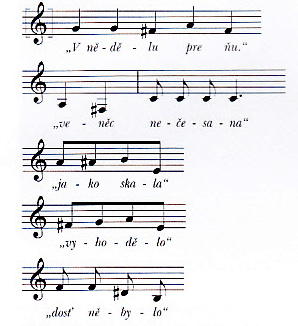Leoš Janáček based vocal melodies in his operas on the concept of nápěvky mluvy (speech melodies)—patterns of speech intonation as they relate to psychological conditions—rather than on a strictly musical basis. He used such melodic motives, characterizing a specific person in a specific dramatic situation, in both vocal and orchestral parts, enabling him to integrate the two parts into a compact unit for the utmost dramatic effect.
This according to “Význam nápěvků pro Janáčkovu operní tvorbu” (The significance of speech melodies in Janáček’s operas) by Milena Černohorská, an essay included in Leoš Janáček a soudobá hudba (Leoš Janáček and contemporary music; Praha: Panton, 1963, pp. 77–80).
Janáček found the source of speech melodies in spoken phrases of people of various social and cultural backgrounds, recorded in real-life situations. During his ethnomusicological research in Moravia and Slovakia in 1920s, Janáček not only recorded songs and music, but also wrote down the melodies of dialogue fragments and of singers’ comments on specific songs.
Recently discovered autographs of Janáček’s fieldwork notes in the collection of the Etnologický ústav AV ČR, pracovišťě Brno with transcriptions of nápěvky mluvy were published in Janáčkovy záznamy hudebního a tanečního folkloru. I: Komentáře (Janáček´s records of traditional music and dances: I. Commentaries) by Jarmila Procházková (Brno: Etnologický ústav AV ČR, 2006).
Today is Janáček’s 160th birthday! Above, examples of nápěvky mluvy that he transcribed in Čičmany, Slovakia, on 20 August 1911; below, the finale of his Jenůfa, a work often cited for its use of the speech-melody concept.



